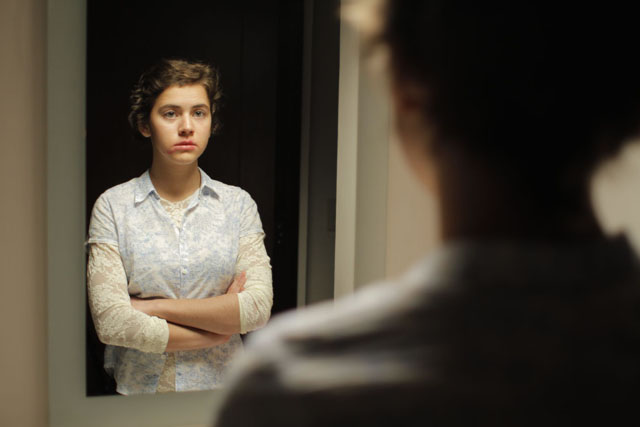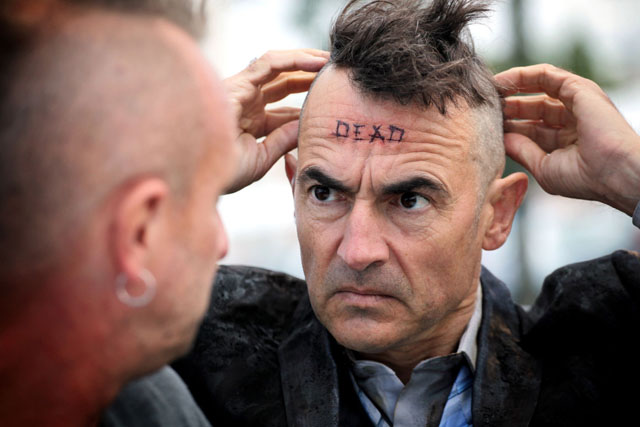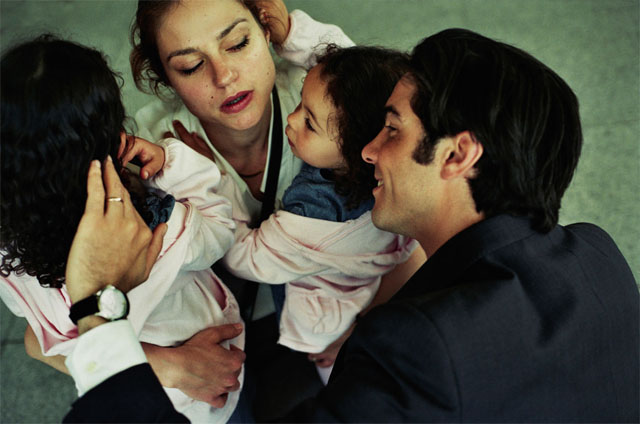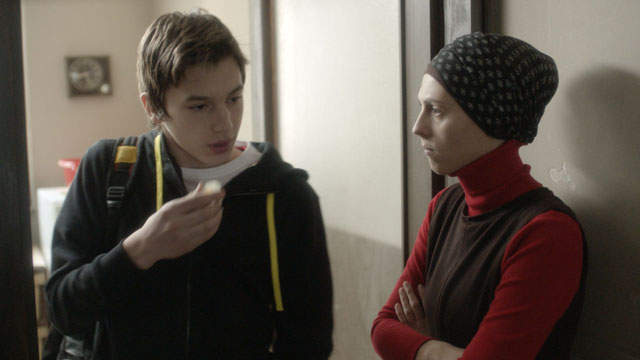Jury President Tim Roth and his fellow Jury members (Leïla Bekhti, Tonie Marshall, Luciano Monteagudo and Sylvie Pras) have awarded the Prix Un Certain Regard to Michel Franco’s After Lucia.
On Thursday, James Quandt wrote in the National Post that “Franco has studied the art film tropes of contemporary cinema, and the elliptical, quietly modulated first half of his film reveals a mastery of suggestive storytelling. A chef and his teenaged daughter move from Puerto Vallarta to Mexico City after their wife/mother is killed in a car accident. These facts emerge slowly, with great indirection, so stating them this bluntly seems like a misrepresentation of the film’s initial moderation.” The “daughter’s popularity at school quickly turns into its opposite when a cellphone video turns viral, and she is labelled a whore. Intent on protecting her father in his grief, she reports nothing of the campaign of degradation—bullying is too mild a term for it—directed against her…. Franco’s narrative and visual control renders the facts of brutality as indisputable, though his restraint unfortunately falters in the final half hour, when the film becomes a revenge drama, betraying its previous abstention.” More from Emissions in the Dark, Charles Gant (Variety) and, in the Hollywood Reporter, David Rooney: “The film is of a piece stylistically with Franco’s debut, Daniel & Ana, which premiered in the Directors Fortnight at Cannes in 2009. Austerity and rigorous control are his signature notes, with an unflinching realism marked by extended silences and a distinct preference for conveying information via oblique glimpses rather than in dialogue.”
Updates, 5/29: “An attractive, almost too textbook example of a contemporary art film, After Lucia works because nothing is overexplained visually or through the dialogue,” writes Manohla Dargis in the New York Times, “and the narrative is hinged to a psychologically complex character. At its simplest, the movie seems to be about bullying, but, as the story unfolds and deepens, and the students strip away the girl’s identity, it evolves into an inquiry into fascism.”
“Most saddening is the lack of conversation between a father and a daughter who clearly love each other,” writes Demetrios Matheou for Sight & Sound. “The suggestion is that Alejandra is protecting her grief-stricken father from further distress, a selfless yet foolish gesture that ultimately benefits neither. Franco has a rigour in the way he goes about his business, a way of developing tension and horror through seemingly banal situations that reminds me of Gerardo Naranjo’s work in Miss Bala.”
The Special Jury Prize goes to Benoît Delépine and Gustave Kervern’s Le Grand Soir, which, as David Fear writes for Time Out New York, “follows the misadventures of two brothers—one an aging gutter punk (Man Bites Dog’s Benoît Poelvoorde), the other a yuppie mattress salesman (Albert Dupontel). While the former runs around a middle-class strip mall causing mayhem, the latter teeters on the verge of a nervous breakdown. Not to worry: His punk brother will be there to give him a mohawk, tattoo the word ‘Dead’ on his forehead and empower his sibling to join the imaginary resistance. The longer the film’s anarchic last act goes on, the more its tweaked tribute to family really flips the bird to the notion of conformity. It climaxes with an epic gesture of futility and a flaming bale of hay rolling right toward the camera.” More from Megan Lehmann (Hollywood Reporter; “scabrous but still kind of sweet”) and, at Cineuropa, Fabien Lemercier: “Their latest opus confirms a path without concessions, on which they are refining their cinematographic skills but also allowing themselves a few excesses, without however deviating from what is essential: an innate sense of revolt and derision.”
Instead of a Best Actor award, the Jury’s going with two for Best Actress: Suzanne Clément for her performance in Xavier Dolan’s Laurence Anyways (see our roundup) and Emilie Dequenne for hers in Our Children, “another tightly wound study of domestic malaise from Belgian auteur Joachim Lafosse,” according to Jordan Mintzer in the Hollywood Reporter. And he highlights, too, the “riveting lead turn from Emilie Dequenne as a young mother caught between two men (A Prophet stars Tahar Rahim and Niels Arestrup) in a claustrophobic nightmare… Inspired by events which took place in a distant suburb of Brussels in 2007, the script—co-written with Thomas Bidegain (Rust & Bone) and Matthieu Reynaert—sticks to many of the facts in the case of Genevieve Lhermitte, who turned herself into the police after coldly and clinically murdering her five kids with a kitchen knife (the film reduces the number to four, but who’s counting?). While such an act may ultimately be inexplicable, the various reasons posited by Our Children very much fit in with the oeuvre of the 37-year-old Lafosse, whose previous films (Private Property, Private Lessons) explored the effects of perversely close-knit relationships on a handful of characters.” More from Peter Debruge (Variety), Fionnuala Halligan (Screen) and Boyd van Hoeij (Cineuropa).
Special Mention goes to Children of Sarajevo. Peter Bradshaw in the Guardian: “The 38-year-old Aida Begić is the Bosnian film-maker who won the Grand Prix at the Critics Week in Cannes four years ago for her debut feature, Snow…. Children of Sarajevo—the original title, Djeca, means ‘children’—is set in the present-day city, in which the ghosts of a terrible past loom all around. The movie does not entirely tie up its narrative threads, but the strange, potent atmosphere makes up for this.” More from Mark Adams (Screen), Megan Lehmann (THR), and Alissa Simon (Variety).
Filmmaker‘s Scott Macaulay takes note of the day’s other awards: “Earlier today, Benh Zeitlin’s Beasts of the Southern Wild picked up the FIPRESCI prize, given by an international jury of film critics, as the best film in the Un Certain Regard section of the main selection. Sergei Loznitsa’s In the Fog picked up the FIPRESCI prize in the Competition, while the jury gave the Director’s Fortnight prize to Rachad Djaidani’s Hold Back. The Cannes Ecumenical Jury gave its prize to Thomas Vinterberg’s The Hunt, with Beasts of the Southern Wild receiving a mention.”
Cannes 2012 Index: a guide to the coverage of the coverage. For news and tips throughout the day every day, follow @KeyframeDaily on Twitter and/or the RSS feed. Get Keyframe Daily in your inbox by signing in at fandor.com/daily.







